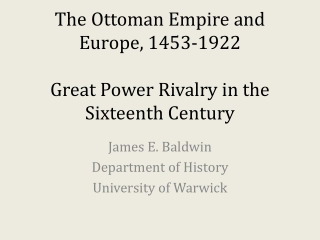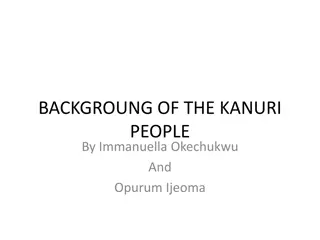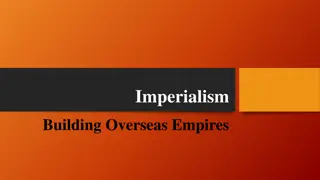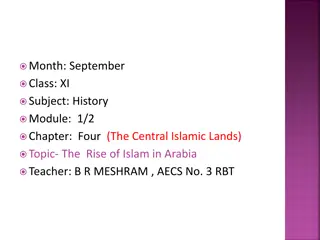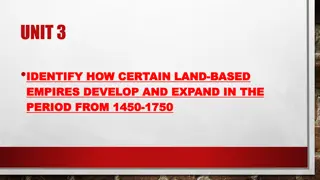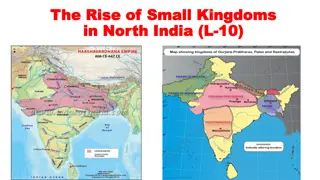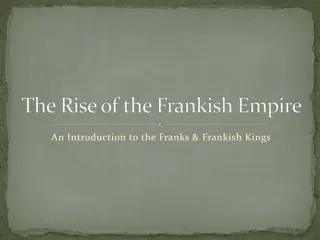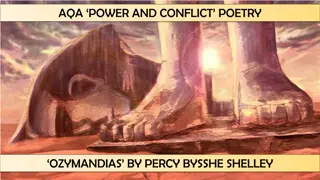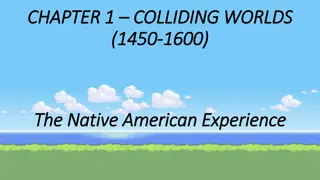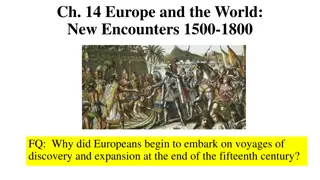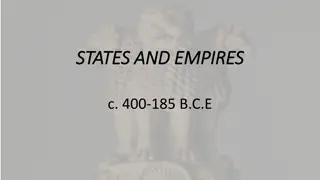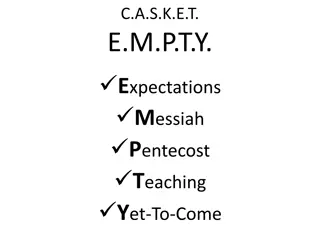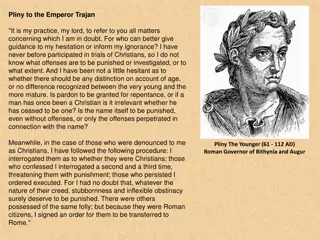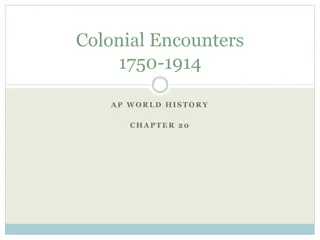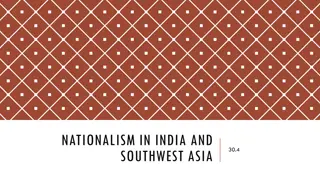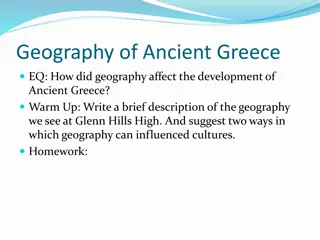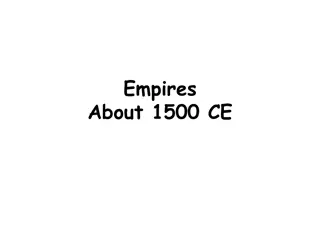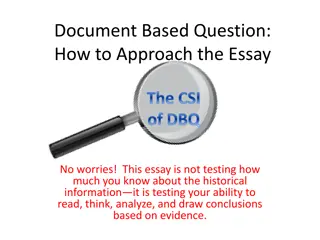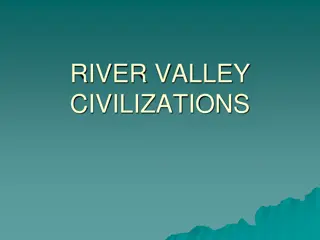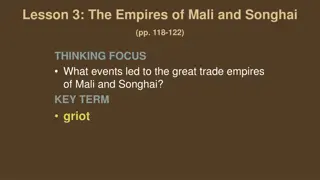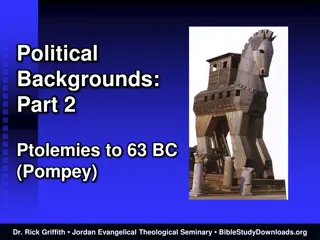The Ottoman Empire and Europe, 1453-1922
The interaction between the Ottoman Empire and European powers, including the Habsburgs, Safavids, Mamluks, and Russia, shaped the geopolitical landscape of the 16th century. This period saw Ottoman expansion, clashes between different empires, and complex motivations behind territorial conquests, i
0 views • 16 slides
Unraveling the Entangled History of Ukraine and Her Neighbors
Explore the intricate history of Ukraine and its neighboring regions from the Middle Ages to the present day, focusing on nation-building phases, interactions with the peasantry, and cultural struggles under various empires. Witness key events like the liberation of peasants, language prohibitions,
0 views • 33 slides
Sub-Saharan Kingdoms of Ghana and Mali: Rise and Fall
The Sub-Saharan Kingdoms of Ghana and Mali were powerful empires in Western Africa, known for their wealth in gold and salt trade. Ghana emerged in 500 A.D. as the first great traders in West Africa, with strong rulers and a well-trained army. The empire of Ghana controlled all gold trade and had a
2 views • 17 slides
Insight into the Kanuri People: History, Culture, and Religion
The Kanuri people, an African ethnic group, primarily inhabit the regions of the former Kanem and Bornu Empires in Niger, Nigeria, and Cameroon. With a rich history dating back to the medieval Kanem-Bornu Empire, they are known for their sedentary lifestyle, farming, fishing, and salt processing tra
0 views • 6 slides
Evolution of Modern Literature in the 20th Century
The Modern Age in literature emerged in response to the Victorian era, marked by a shift in attitudes towards life and society. Influenced by historical, economic, and ideological factors such as World Wars, capitalism, and the disintegration of empires, Modern Literature explored new themes and sty
1 views • 14 slides
European Imperialism in the Late 19th Century
European nations in the late 1800s pursued imperialism to expand their empires for economic, political, and social reasons. Motives included economic interests, political and military ambitions, and the ideology of Social Darwinism. The Industrial Revolution fueled the need for resources and markets
1 views • 14 slides
The Rise of Islam in Arabia: Understanding Islamic Empires and Culture
Explore the origins and development of the Islamic community in the Arabian Peninsula, spanning from 600 to 1200 AD. Learn about the rise of Islamic empires in Afro-Asian territories, the impact of the Crusades, and the evolution of faith, politics, and society. Delve into key concepts such as the C
0 views • 22 slides
Indigenous Economy of Pre-Colonial Nigeria
The indigenous economy of pre-colonial Nigeria was characterized by agriculture, local industries, crafts, trade, and services. Agriculture was the primary activity, with various crops grown and other occupations like hunting and fishing. Local industries included weaving, pottery, blacksmithing, an
0 views • 22 slides
Land-Based Empires Development and Expansion from 1450-1750
Explore how certain land-based empires developed and expanded between 1450 and 1750, including the Gunpowder Empires in Southwest, Central, and South Asia, the effects of the Gutenberg Printing Press, the Ghazi Ideal, and key empires, leaders, and cultures in West Africa, the Middle East, Eastern Eu
0 views • 5 slides
Emergence of Small Kingdoms in North India During 8th to 10th Century
The rise of small kingdoms in North India between 750 CE to 1000 CE was a result of the disintegration of empires, economic struggles, and weak administration. This period saw the emergence of powerful kingdoms like the Rastrakutas, Palas, and Pratiharas in different regions of India, each contribut
0 views • 28 slides
The Rise of the Frankish Empire: A Journey Through History
Explore the fascinating history of the Frankish Empire from the conquest of Gaul by the Franks in the 5th century to the reign of Charlemagne as the Holy Roman Emperor. Discover key events such as Clovis I's unification of the Franks, Charles Martel's victory at the Battle of Tours, and Charlemagne'
4 views • 6 slides
Empires Implementation Workshop: VCE History Units 1 and 2
Explore Units 1 and 2 of VCE History focusing on empires, their rise, challenges, and consequences. Get insights on teaching ideas, areas of study, and the selection of empires for study. Acknowledge the traditional custodians of the land and delve into changes in outcomes and skills refinement.
0 views • 28 slides
Ancient Civilizations of the Fertile Crescent
Explore the geography and history of the Fertile Crescent, including Mesopotamia, Sumer, and later civilizations like Babylon. Learn about the rich farmland, nomadic lifestyle, irrigation methods, Sumerian achievements in writing, and the rise of empires under rulers like Sargon and Hammurabi.
0 views • 13 slides
Government Responses to Economic Change in Qing China and Ottoman Empire
Explore the similarities in government responses to economic change in Qing China and the Ottoman Empire during the late 19th and early 20th centuries. Discover how both empires sought to uphold traditional values amidst global modernization trends, shaping their strategies for economic stability an
0 views • 14 slides
Exploring Percy Bysshe Shelley's "Ozymandias": Power, Conflict, and Decay
Delve into the themes of power and conflict in Percy Bysshe Shelley's iconic poem "Ozymandias", which explores the rise and fall of empires through the lens of a decaying statue in the desert. Discover the historical context, poetic analysis, and oracy tasks related to this timeless piece of literat
0 views • 21 slides
Precolonial Administration in Nigeria: A Historical Analysis
Nigeria's precolonial administration was characterized by diverse kingdoms and empires with unique social structures and governance systems. The Hausa/Fulani society, for example, had a centralized political system organized around city-states, while other societies operated with decentralized power
0 views • 22 slides
The Rise of Nationalism in Europe: French Revolution and Revolutionary France
The rise of nationalism in Europe during the French Revolution and Revolutionary France era is explored, defining key terminologies like Absolutist Institutions, Utopian, Charter of the Rights of Man, Nation State, Modern State, and Multi-National Dynastic Empires. The French Revolution marked the f
1 views • 15 slides
Exploring Early American Civilizations and Cultures
The journey through Chapter 1 delves into the collision of worlds between Native Americans and European settlers from 1450 to 1600. It uncovers the experiences of the first Americans, the rise of American empires like the Aztec and Incan civilizations, and the development of chiefdoms and confederac
0 views • 22 slides
European Voyages of Discovery: Motives and Achievements (80 characters)
Europeans embarked on voyages seeking God, glory, and gold at the end of the 15th century. Portugal and Spain acquired overseas empires through exploration, trade, and religious zeal, leading to the discovery of new lands and the establishment of global trade routes. Key figures like Prince Henry th
3 views • 17 slides
Notorious Criminals: Al Capone and Pablo Escobar
Al Capone and Pablo Escobar were infamous criminals who ran violent empires in Chicago and Colombia, involved in bootlegging, drug trafficking, and other illegal activities. Capone's reign led to the St. Valentine's Day Massacre, while Escobar's ruthless methods made him the "King of Coke." Their cr
0 views • 16 slides
Exploration and Colonization of the Americas
Before Columbus, Native American groups thrived across the Americas, ushering in the Agricultural Revolution. European explorers like Columbus, Portuguese, and Spanish ventured west in search of Eastern goods and new lands, leading to colonization, conflicts, and the Columbian Exchange. Motivated by
2 views • 56 slides
Rise of States and Empires in Ancient India
Explore the emergence and consolidation of power under the Mauryan Dynasty in ancient India, focusing on key figures like Ashoka and significant historical developments such as the shift eastward in intellectual and political life. Discover the richness of sources detailing the period's political, e
0 views • 19 slides
Insights into the Intertestamental Period and Second Temple Judaism
Explore the significance of the Intertestamental Period and the evolution of Second Temple Judaism through major events, empires, and key figures such as the Persians, Greeks, Hasmoneans, and Romans. Uncover the historical context surrounding this pivotal era that laid the groundwork for the transit
1 views • 17 slides
Discussions on Christians, Justice, and the City of God
Pliny the Younger consults Emperor Trajan on handling Christian trials, Trajan advises on fair treatment. St. Augustine draws parallels between earthly and heavenly cities, highlighting the morality behind founding empires.
0 views • 11 slides
Trade and Exchange Along the Silk Roads in Ancient Eurasia
The Silk Roads facilitated exchange of goods between people in different ecological zones, encouraging specialization and altering consumption patterns. Long-distance trade across Eurasia led to the growth of classical empires like Rome, China, and the Mongol Empire. Traders along the Silk Roads pla
0 views • 13 slides
European Colonial Encounters 1750-1914: Paths to Imperialism
Second wave European conquests in the 18th and 19th centuries saw a shift towards informal control and military force in establishing empires in Africa and Asia. Various paths to colonial status emerged in India, Indonesia, Australia, and New Zealand, reflecting different colonization methods and ou
0 views • 21 slides
Insights into Early World Trade Routes
Early long-distance trade primarily dealt with luxury items like silk, gold, and spices before 1500. The growth of markets reflects economic vitality and the benefits and losses of trade on society have been analyzed historically. Trade networks connected diverse cultures, with trade diasporas datin
0 views • 20 slides
Understanding Central Asia: Dynamics and Influences
Central Asia and its neighboring regions exhibit a complex interplay of various powers and influences, shaping geopolitical landscapes. With no single dominant force, the region witnesses the rise of China, endeavors by Russia to maintain influence, and US/European strategies influenced by the Afgha
0 views • 37 slides
Nationalism in India and Southwest Asia: A Historical Overview
The aftermath of World War I led to a surge in nationalism in India and certain Southwest Asian countries, as empires like the Ottoman Empire and the British Empire showed signs of weakening. Indian nationalism grew due to factors such as promises of reform by the British, religious divisions, and e
0 views • 15 slides
Exploring the Power of Time in Poetic Works
Delve into the representation of time in the poems "Tissue" and "Ozymandias," exploring themes of transience, mortality, and the impact of time on empires. Through the poets' insightful reflections, witness the contrast between the fragility and endurance of historical records amid shifting cultural
0 views • 6 slides
Impact of Geography on Ancient Greek Development
Ancient Greece's mountainous terrain led to the development of diverse, independent communities that often clashed. The geographical location, sandwiched between the Mediterranean Sea and neighboring empires, influenced technological advancements such as naval prowess and aqueduct systems. Terracing
0 views • 7 slides
The Empires and Explorations of 1500 CE
Explore the empires and events of 1500 CE, from the Ottoman Empire to the Mughal Empire, and the reasons behind European exploration. Immerse yourself in the history of trade, culture, and conquests that shaped this era.
0 views • 26 slides
Precolonial Administration in Nigeria: Governance Systems and Structures
Nigeria's precolonial era was characterized by diverse societies with various governance structures such as the centralized Hausa/Fulani system and decentralized systems. Different kingdoms and empires existed, each with its unique social organization, political leadership, and economic activities.
0 views • 22 slides
Ancient Israel & Early Christianity in Jeopardy
Explore the historical and religious significance of Ancient Israel and Early Christianity through Jeopardy! questions on topics like the Ten Commandments, Hebrew Bible, Emergence of Christianity, and more. Delve into the stories of figures like Jesus Christ, Abraham, and the Roman Emperor Constanti
0 views • 19 slides
Unveiling the Strengths and Weaknesses of Muslim Empires
Explore the rise and fall of the Ottoman, Safavid, and Mughal empires through a document-based question (DBQ) essay. Understand the factors attributing to their success and decline, analyze historical backgrounds, and discuss potential empire-building strategies. Dive into the investigation with cri
0 views • 10 slides
River Valley Civilizations: The Birth of Early Societies
Explore the impact of geography and the Neolithic Revolution on the development of River Valley Civilizations like Mesopotamia. Learn about key vocabulary, the rise of civilizations in fertile river valleys, government structures, economies based on agriculture, and religious beliefs in polytheism.
0 views • 48 slides
Chinese Dynasties and Philosophies: From Han to Tang
Explore the rich history of Chinese dynasties from the Han to Tang periods, including the influence of Confucianism, Buddhism, and Daoism on society and governance. Witness the rise and fall of empires, cultural blending, and the societal values that shaped ancient China.
1 views • 9 slides
US Overseas Expansion in the Late 19th & Early 20th Centuries: Key Concepts & Movements
Explore the reasons behind US overseas expansion in the late 19th and early 20th centuries, including economic opportunities, racial theories, competition with European empires, and the perception that the frontier was closed. Delve into key events, figures, and debates such as the annexation of Haw
0 views • 12 slides
The Empires of Mali and Songhai: Rise of Prosperous Trade and Powerful Kingdoms
Mali and Songhai rose to prominence through events like King Sundiata's defeat of Ghana, leading to prosperous trade in gold and salt, and Mansa Musa's expansion and enrichment of the empire. Griots played a key role in passing down the stories of these empires, showcasing their cultural significanc
0 views • 27 slides
Ancient Empires and Biblical History Timeline
Explore the political backgrounds from the Ptolemies to Pompey in 63 BC, including details on geographical locations in Acts and Epistles, the order of empires such as Greek, Babylonian, Assyrian, Roman, and Medo-Persian, developments during the Assyrian and Babylonian rules, Persian era returns, an
0 views • 38 slides
